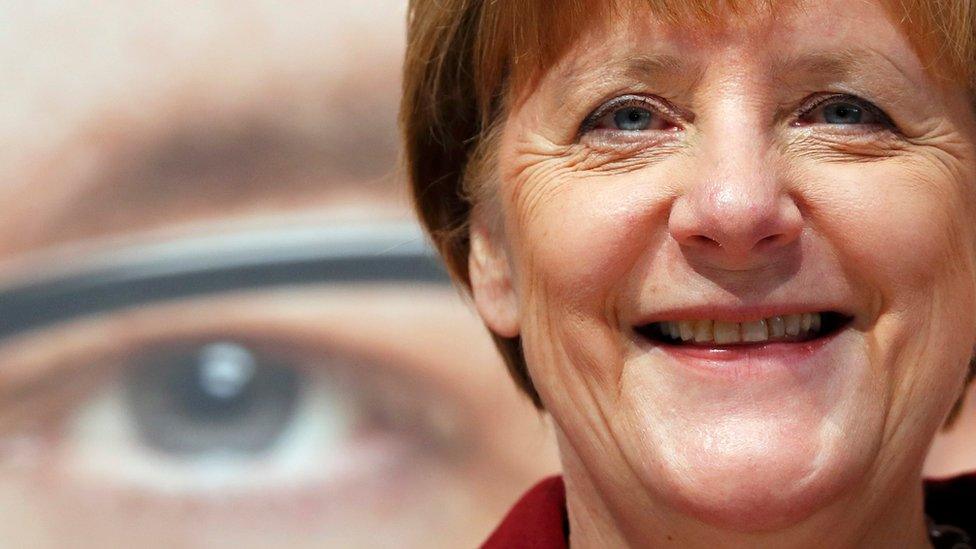German elections: Papers say Merkel 'paying price'
- Published

Tabloid Bild invents a new word to describe Sunday's result, combining Wahnsinn ("Madness") and Wahl ("Election").
Germany's press is reeling from the dramatic - and partly contradictory - results of Sunday's elections in three federal states.
"What election madness!" tabloid Bild exclaims in a banner headline, while the a report in Sueddeutsche Zeitung, external predicts: "These elections will change Germany."
Several papers believe Ms Merkel and her Christian Democrats are "paying the price" for her liberal policy on immigration.
"The refugee crisis has re-shaped the party landscape," an editorial in Die Welt, external says, adding that not everyone in her party will forgive her for putting its interests behind those of "Europe and her country too".
A commentary in the Frankfurter Allgemeine Zeitung, external agrees, saying Ms Merkel was "punished" for her course.
"Merkel stood in none of the federal states where people went to the polls on Sunday," it says, "but everywhere was a vote on her policy".
But - reaching for Biblical allusions - it adds that it is more likely "for a camel to go through the eye of a needle" than for Ms Merkel to change her mind.
'85% stay cool'
A commentary in Bild, external, however, rejects the idea that the result is a rejection of Chancellor Angela Merkel's open-door policy, despite her Christian Democrat party's "crushing defeat".

Regional paper Hamburger Morgenpost talks of "the AfD nightmare" under a picture of its jubilant leader, Frauke Petry, but the Tageszeitung is less concerned
It points out that the pro-immigration Social Democrat and Green premiers of two states - Rhineland Palatinate and Baden Wuerttemberg - gained votes.
The Tageszeitung agrees. Under the front-page headline "85% stay cool", it points out that the "overwhelming majority" have voted for parties that support Ms Merkel's course.
"The winners of these elections are fear, exclusion and authoritarianism," a commentary in the paper , externalconcedes.
But it adds that the rise of the anti-immigration Alternative for Germany is largely the result of the mainstream parties' "confusion and loss of trust" in their own programme, in their own supporters and even in Germany.
'Everything is in flux'
A commentary in business paper Handelsblatt, external says the results are a "wake-up call" for Germany's mainstream parties - the Christian Democrats and the Social Democrats.

Sueddeutsche Zeitung's graphics highlight the decline of the two main parties - in black and red - while Handelsblatt speaks of a "wake-up call" above a struggling Ms Merkel
It adds that the crisis goes beyond the refugee issue, and that neither of the two seems able to provide answers to people's concerns about the impact of technology on jobs, tough global competition, security fears and low interest rates.
"It's a warning signal for a society that is deeply rattled and disappointed with politics," it says. "Business as usual is not an option."
In the Sueddeutsche Zeitung, a commentary, external adds that the vote is a "look into future of German democracy": The continued decay of the old party landscape, the "browning" - a reference to the Nazis' brown shirts - of the former East.
But it argues that the successes of the right-wing populist Alternative for Germany are "no cause for hysteria", and that it could itself soon enough suffer from the new electoral volatility.
"Everything is in flux - the apparently safe is no longer safe," it concludes.
BBC Monitoring reports and analyses news from TV, radio, web and print media around the world. You can follow BBC Monitoring on Twitter, external and Facebook, external.
- Published12 March 2016

- Published10 March 2016